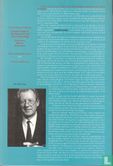Sixth augmented edition
Arnold Cornelis (1934 - 1999) was a cultural philosopher, epistemology theorist and author. He obtained his PhD in philosophy at the University of Ghent, with a dissertation entitled 'Society as a learning process'. He taught philosophy and social theory of knowledge at the universities of Ghent, Groningen and Amsterdam and he also held the chair for social theory of knowledge and science at the Faculty of Economic, Social and Political Sciences of the Vrije Universiteit Brussel.
Main work:
His main work The Logic of Feeling tells about the layers of stability in culture as the nesting place of emotions. In this comprehensive book, Cornelis reports on more than twenty years of research. In his theory he sees the individual as well as society going through three phases in which the logic of feeling must always be able to settle in order not to fall into a developmental stagnation. He gives man as well as society the wheel again in the form of feeling in order to be able to give direction and meaning to our existence.
As a child we went through a natural system where security and love gave meaning to our existence, we find safety in the mother in the natural system that is characterized by the family. In adolescence we end up in the new world of the social rule system, here we come into contact with new ways of survival and our existence takes on a new meaning. Rationality governs this system and we must therefore be able to sustain ourselves in the rough world outside the family. Now we as a society are at the foot of a new layer of stability; the communicative system. In our personal life, this transition is characterized by the midlife crisis that not everyone survives unscathed.
Other works:
The Delayed Time and Rests of the Mind. Both of these works are a continuation of his main work focused on the individual.
In De delayed time, Cornelis indicates how we can delay our internal time compared to external time. The book advocates the emancipation of the mind.
Education:
Arnold Cornelis outlines in his books guidelines for organizations in the field of education, but also the business community of the future. He describes a new way of learning and teaching that we are now seeing more and more emerging in educational systems such as Elkewijs and democratic schools. Regular education is also increasingly innovating in the direction of Cornelis' ideas.
He stands for education in which the self-direction of the student is paramount. In the new stability layer of the communicative system, truth is transformed into the emancipatory capacity for communicative resilience. This points to the great importance of the learning process of one's own identity. The cultural environment must be highly responsive, that is to say that part of the own identity can be communicated in the environment. For example, when you paint the walls of your house, you place part of your identity in the social structure of your environment. The computer is an example of an environment that is highly responsive.
This text has been translated automatically from Dutch
Click here for the original text
Zesde vermeerderde druk
Arnold Cornelis (1934 - 1999) was cultuurfilosoof, kennistheoreticus en auteur. Hij promoveerde tot doctor in de wijsbegeerte aan de Rijksuniversiteit van Gent, op een proefschrift getiteld 'De maatschappij als leerproces'. Hij doceerde filosofie en sociale theorie van de kennis aan de universiteiten van Gent, Groningen en Amsterdam ook bekleedde hij de leerstoel voor sociale theorie van kennis en wetenschap aan de Faculteit Economische, Sociale en Politieke Wetenschappen van de Vrije Universiteit Brussel.
Hoofdwerk:
Zijn hoofdwerk de Logica van het gevoel verhaalt over de stabiliteitslagen in de cultuur als nesteling der emoties. In dit veelomvattende boek doet Cornelis verslag van meer dan twintig jaar onderzoek. Hij ziet in zijn theorie de individuele mens zowel als de maatschappij door een drietal fasen gaan waarin de logica van het gevoel zich steeds moet kunnen nestelen om zo niet te vervallen in een ontwikkelingsstagnatie. Hij geeft de mens zowel als de maatschappij het stuur opnieuw in handen in de vorm van het gevoel om zo sturing en betekenis te kunnen geven aan ons bestaan.
Als kind zijn we door een natuurlijk systeem gegaan waar geborgenheid en liefde betekenis gaf aan ons bestaan, de veiligheid vinden wij bij de moeder in het natuurlijke systeem dat gekenmerkt wordt door het gezin. In de adolescentie komen we in de nieuwe wereld terecht van het sociaal regelsysteem, hier komen wij dan ook in contact met nieuwe manieren om te overleven en krijgt ons bestaan een nieuwe betekenis. Rationaliteit beheerst dit systeem en wij moeten hierin dan ook onszelf staande weten te houden in de ruwe wereld buiten het gezin. Nu staan wij als maatschappij aan de voet van een nieuwe stabiliteitslaag; het communicatieve systeem. In ons persoonlijk leven wordt deze overgang gekenmerkt door de midlifecrisis die niet iedereen zonder kleerscheuren overleeft.
Andere werken:
De vertraagde tijd en Rustpunten van de geest. Deze beide werken zijn een voortzetting van zijn hoofdwerk toegespitst op het individu.
In De vertraagde tijd geeft Cornelis aan hoe wij onze interne tijd kunnen vertragen ten opzichte van de externe tijd. Het boek pleit voor de emancipatie van de geest.
Onderwijs:
Arnold Cornelis schetst in zijn boeken richtlijnen voor organisaties op gebied van onderwijs maar ook het bedrijfsleven van de toekomst. Hij beschrijft een nieuwe manier van leren en onderwijs die we nu steeds meer zien opkomen in onderwijssystemen zoals Iederwijs en de democratische scholen. Ook het reguliere onderwijs vernieuwt zich steeds meer in de richting van Cornelis' ideeën.
Hij staat voor onderwijs waarin de zelfsturing van de student voorop staat. Waarheid wordt in de nieuwe stabiliteitslaag van het communicatieve systeem getransformeerd in het emancipatorische vermogen tot communicatieve weerbaarheid. Dit wijst op het grote belang van het leerproces der eigen identiteit. De culturele omgeving dient in hoge mate responsief te zijn, dat wil zeggen dat er een stuk van de eigen identiteit in de omgeving kan worden gecommuniceerd. Wanneer je bijvoorbeeld de muren van je huis schildert leg je een stuk van je identiteit in de sociale structuur van jouw omgeving. De computer is een voorbeeld van een omgeving die in hoge mate responsief is.











